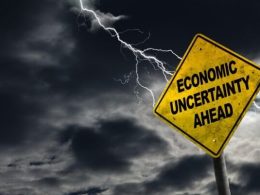by Scott Krisiloff, Avondale Asset Management
Each week we read dozens of transcripts from earnings calls and presentations as part of our investment process. Below is a weekly post which contains some of the most important quotes about the economy and industry trends from those transcripts. Click here to receive these posts weekly via email.
Earnings began to trickle in slowly this week and I will admit that the commentary was a little weaker than I was expecting. This is a very small sample, but most CEOs were still talking about a weak environment. I was expecting to hear a little more optimism. The verdict isn’t in yet though. The deluge comes over the next few weeks.
The Macro Outlook:
It looks like its still a tough business environment
“you all watch the news, I am not sharing a secret here. It’s not a great environment to do business in. But that’s the world we live in and that’s the world we need to contend with. And there is a lot of uncertainty.” —Fastenal CEO Dan Florness (Industrial Distributor)
Economic fundamentals remain weak and volatile
“Overall, it is fair to say that the economic fundamentals remain weak and volatile…We are not expecting improvement in market conditions in the fourth quarter and indeed markets are likely to remain volatile and hence challenging for a while yet” —Unilever CFO Graeme Pitkethly (Consumer Products)
There were not a lot of changes in September
” we didn’t see a lot of changes in September. We might be lapping some of the issues around the energy side, but …We will see how that plays out through fourth quarter…regionally, we indicated the U.S. was a little bit weaker than the international.” —Fastenal CFO Holden Lewis (Industrial Distributor)
Everyone’s longer term growth expectations have come down
“oming into this year, we sort of took it for granted that we grow mid single-digits and plan to invest around that. I am not sure that we are making…any such assumption about the go forward market given that we haven’t seen any meaningful improvement in the markets. And so we are not necessarily going to assume that we are going to make those same investments for that same level of growth.” —Fastenal CEO Dan Florness (Industrial Distributor)
Perhaps with good reason
“Revenues of 3.4 billion, that’s down 1% year-over-year…we’ve seen large commercial aircraft deliveries up 3%. The growth year-to-date is kind of flat and so we believe that the year 2016 is more likely to come out at the low end of the range and the range being 0 to plus 3%…So let’s move on to automotive and let’s go to North America. We believe it’s going to grow 1% to 2%.” —Alcoa CEO Klaus Kleinfeld (Aluminium)
“Revenue declined 8% in the quarter, consistent with an overall volume decline of 8% which included a 21% decline in coal volume.” —CSX CEO Michael Ward (Railroad)
“the biggest challenge we face as a company is the persistent decline of unit revenues. This quarter our RASM was down 6.8%.” —Delta Airlines President Glen Hauenstein (Airline)
Pricing power may be turning up though
” pricing has been low or negative for the past few years as a result of the benign commodity cost environment…As commodities have stabilized and start to turn up, we are seeing a return to more normal price inflation or in the case of Europe reduce deflation in some markets.” —Unilever CFO Graeme Pitkethly (Consumer products)
“in terms of overall same store sale pricing we’re obviously very transparent…There is clearly more difficult sale environment and it’s been there for a period of time as we see a significant amount of excess capacity…As the market turns, and it will turn…and if the economy continues to expand and unemployment stays low that should lead to a much better environment as we get into late ‘17 and that will be helpful.” —CSX CFO Frank Lonegro (Railroad)
“if you look back at history, significantly lower fuel ultimately translates into lower fares. That’s kind of a very high correlation over a long period of time, higher fuel turns into higher fares. The exact lag can vary, but it’s usually in the 3 to 5 month category. And as Paul says, we’re facing higher fuel. And so we would expect…for that to work its way back into the pricing structure, that it is right around the corner, we feel.” —Delta Airlines CFO Paul Jacobson (Airline)
If interest rates do rise it could have massive implications for the global economy
“Global debt levels in the combined corporate and household sectors rose to 327% of GDP at the close of last year, based on our analysis. By comparison, this figure was 227% on the eve of the financial crisis…These rising debt loads are even more worrying when juxtaposed against declining or negative productivity, declining marginal efficiency of capital, and declining returns on investment. The low interest rate environment has depressed the costs of servicing this debt, but when rates rise these costs are going to be a heavy burden.” —Institute of International Finance CEO Tim Adams (Trade Organization)
Meanwhile the Fed is pondering the theory of starred r’s
“Participants discussed reasons for the apparent fall over recent years in the neutral real rate of interest–or r*–including lower productivity growth, demographic shifts, and an excess of saving around the world. Although several participants indicated that there was uncertainty as to how long the low level of r* would persist, one pointed to a growing consensus that the long period of slow productivity growth and recent evidence that the neutral rate had fallen across countries suggested that r* was likely to remain low for some time. A number of participants noted that they had revised down their estimates of longer-run r* in their contributions to the Summary of Economic Projections for this meeting. Participants discussed the implications of a fall in longer-run r* for monetary policy, including the possibility that policy interest rates might be closer to the effective lower bound more frequently and for a long period, or that monetary policy was ill equipped to address structural factors such as the decline in productivity growth.” —FOMC Meeting Minutes (Central Bank)
International:
The long term consequences of Brexit may be starting to be revealed
“While in Washington I spoke to large American businesses and banks. Until now their question was whether Brexit will happen or might it take longer than expected. That’s over. They are telling us clearly that there will be a transfer of activity. It’s no longer a question of if but when. I don’t know to what extent or which ones. That’s the inevitable consequence whatever the outcome of the Brexit negotiations.” —French Finance Minister Michel Sapin
New York may actually be a big winner
“The big winner for Brexit will be New York; you’ll see more business moving to New York.” —Morgan Stanley CEO James Gorman (Investment Bank)
Jamie Dimon thinks Brexit raises the odds that the Euro Zone wont survive
“Brexit makes the chance of the euro zone not surviving 10 years from now five times higher.” —JP Morgan CEO Jamie Dimon (Bank)
At least the UK should get some inflation out of it
“We are taking price increases in the UK and that is a normal devaluation-led cycle” —Unilever CFO Graeme Pitkethly (Consumer products)
China showed more strength than some expected
“On China, we actually believe that it’s going to be better than what we saw in the last quarter, 6% to 8% we see here up from the 3% to 5% that we saw before. Production is up almost 11%, sales up 11%, and some of the legislation is helping us to get boosted. So that’s the picture on automotive.” —Alcoa CEO Klaus Kleinfeld (Aluminium)
It’s tough to say if this is the start of a trend
“With regard to Hong Kong and Mainland China, there was some improvement there, particularly in Mainland China…whether this is a start of a new trend, I absolutely don’t know. We’ve seen in the past already some quarters in which the Chinese nationals were doing much better than in the preceding quarters and it was short lived.” —LVMH Management (Luxury Brands)
Brazil may be bottoming out
“we think that Brazil has bottomed and I’d say we saw that based on the fundamentals of the businesses we have there in February or March of 2016, this year, and it’s going to be a slow way back but we think it’s slowly coming back.” —Brookfield Asset Management CEO Bruce Flatt (Private Equity)
Financials:
Low interest rates are reshaping the entire global banking industry
“We’re clearly aware of the need to adjust our business models. We’re managing a transition that’s tough…This new world of low interest rates and even negative interest rates is something that is very difficult…It is a game changer, not just for banks but for the whole financial industry.” —Societe Generale SA CEO Frederic Oudea (Bank)
“Crisis is the wrong word. We are in the middle inning of the reshaping of the financial landscape.” —Blackrock Senior MD Mark McCombe (Asset Management)
If you want higher growth you have to let banks do what they do
“If you want higher growth, you have got to let banks do what they do. This is an industry which is essential to global economic growth.” —Morgan Stanley CEO James Gorman (Investment Bank)
A large CRE lender was defensive about negative articles written about CRE markets
“Because we are one of the largest and most active CRE lenders in the country, we have received attention in recent articles regarding CRE…You have got all these articles and a lot of these articles are self propagating articles. One person writes an article about CRE that causes another person to write an article about CRE and you have this whole litany of articles about CRE written by people who, by and large, don’t understand the market. And in many cases, some do, but many don’t. And the result of that is you end up with a lot of commentary about the markets that are just not consistent with the reality that’s occurring in the market.” —Bank of the Ozarks CEO George Gleason (Regional Bank)
Hurricane Matthew didn’t do too much damage, but there will be some insurance losses
“our resorts on the East coast of Florida were reopened over the weekend sustaining minimal damage and have begun their efforts to get back to normal operations… we do obviously have business interruption insurance…that covers everything from COAs and the on-site locations in our properties as well as marketing and sales disruptions” —Marriott Vacations Worldwide CEO Steve Weisz (Timeshares)
Consumer:
The highest end consumer brands may not need ecommerce or Amazon
“on eCommerce you know our feeling on eCommerce, which we don’t view in itself as a big opportunity. We believe very much in the digital content of the selling experience…we also believe a lot in e-marketing…but in itself we don’t expect these to become a big, big channel…on Amazon, I would say that no, not really…we believe that the existing business of Amazon doesn’t fit with our — doesn’t fit our luxury full stop…there is no way we can do business with them for the time being.” —LVMH Management (Luxury Brands)
The Chinese love e-commerce
“In China…The market channel structure is shifting rapidly to e-commerce. Two years ago, this was just 3% of our sales, today it’s over 10%.” —Unilever CFO Graeme Pitkethly (Consumer Products)
Technology:
Alibaba’s cloud hosts 1/3 of all websites in China
“Today, Alibaba Cloud hosts 35% of total websites in China while also providing clients with cloud computing and big data services. Alibaba Cloud is a company with cutting-edge technology and an extensive range of products and now ranks among the world’s top three cloud computing companies.” —Alibaba CEO Jack Ma (Amazon clone)
Industrials:
More international cargo is coming to the east coast but not necessarily because the Panama Canal has been widened
“we’re seeing and have been seeing is a continued shift towards more East Coast internationally intermodal coming in versus West Coast….We have seen the shift for an extended period of time…we have not seen a significant change in the amount of volume coming in since the Panama Canal got widened. ” —CSX CFO Frank Lonegro (Railroad)
Full transcripts can be found at www.seekingalpha.com
Copyright © Avondale Asset Management















